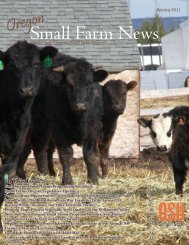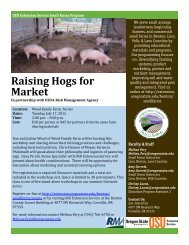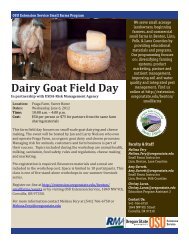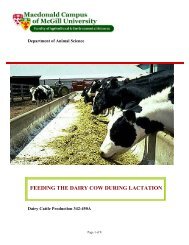Small Farm News - Oregon Small Farms - Oregon State University
Small Farm News - Oregon Small Farms - Oregon State University
Small Farm News - Oregon Small Farms - Oregon State University
Create successful ePaper yourself
Turn your PDF publications into a flip-book with our unique Google optimized e-Paper software.
Exploring Value-Added Agriculture<br />
By: Melissa Matthewson<br />
“Your uniqueness is the only source of profitability that<br />
cannot be competed away, and thus, is the only source of<br />
sustainable profits.” –John Ikerd1<br />
Value-added agriculture entails changing a raw<br />
agricultural product into something new through<br />
packaging, processing, cooling, drying, extracting or<br />
any other type of process that differentiates the product<br />
from the original raw commodity. Examples of value<br />
added agricultural products include garlic braids, bagged<br />
salad mix, artisan bread, lavender soaps and sausages.<br />
Adding value to agricultural products is a worthwhile<br />
endeavor because of the higher returns that come with<br />
the investment, the opportunity to open new markets<br />
and extend the producer’s marketing season as well<br />
as the ability to create new recognition for the farm.<br />
Increasingly, value-added products are hitting the local<br />
market as producers take advantage of high-demand<br />
product niches. This is the key to success in value added<br />
agriculture—niche markets are where smaller producers<br />
can be most successful in creating value and establishing<br />
a profitable business.<br />
Resources<br />
<strong>Oregon</strong> Department of<br />
Agriculture<br />
www.oda.gov<br />
Food Innovation Center<br />
http://fic.oregonstate.edu/<br />
OSU Extension Service<br />
<strong>Small</strong> <strong>Farm</strong>s Program<br />
http://smallfarms.oregonstate.edu<br />
ATTRA<br />
www.attra.org<br />
market to cover any<br />
sort of illness or<br />
other food safety<br />
issues that may<br />
arise. The <strong>Oregon</strong><br />
Department of<br />
Agriculture’s Food<br />
Safety department<br />
handles the licensing<br />
of food businesses<br />
in the state of<br />
<strong>Oregon</strong>. Find out<br />
more information<br />
on their website<br />
at www.oda.gov.<br />
These regulation<br />
challenges make<br />
it difficult to get<br />
started in the valueadded<br />
business, but with a solid business plan in place,<br />
producers can be successful in overcoming obstacles to<br />
their food business dream.<br />
A study of fourteen farmers in the Southern US<br />
conducted by ATTRA and the Southern Sustainable<br />
Agriculture Working Group identified ten keys to success<br />
when pursuing a value-added business. These include:<br />
starting small and growing naturally; making decisions<br />
based on good records; creating a high-quality product;<br />
following demand-driven production; getting the whole<br />
family or partners involved; keeping informed; planning<br />
for the future; continuing evaluation; persevering<br />
and having adequate capitalization.2 Take these<br />
recommendations into mind when you are designing<br />
your product and business plan.<br />
Value added agriculture is not without its challenges to<br />
farmers. One of the largest hurdles to overcome is that<br />
of food business and safety regulations. For example,<br />
if you are interested in taking your organic blueberries<br />
and turning them into a high quality jam that you can<br />
sell at the local farmers’ market, you must be a licensed<br />
commercial kitchen in order to produce that product<br />
and sell to local consumers. You will also need to carry<br />
liability insurance if you are selling at the farmers’<br />
Another example of a significant challenge for starting<br />
a value-added business is putting together your recipes<br />
or formulations for the product you are developing. For<br />
instance, making soap from your lavender flowers requires<br />
time and effort in finding the right recipe for high-quality<br />
soap. You will also want to research the market potential<br />
for your product in order to define your customer profile,<br />
so that you are not wasting your time in formulating a<br />
product that will not sell. The Food Innovation Center is<br />
an excellent resource for small business owners interested<br />
in starting a value-added business. They can assist with<br />
formulation, education etc. Check out their website at http://<br />
fic.oregonstate.edu/.<br />
Starting a value-added agricultural business is an exciting<br />
opportunity for the small farmer interested in diversifying<br />
and exploring new markets, but starting small and finding<br />
your niche is key to your long-term success. Evaluate the<br />
risks associated with the business and have a solid plan in<br />
place to keep you on the right track.<br />
1 & 2 Keys to Success in Value-Added Agriculture, Holly Born, www.attra.org<br />
<strong>Oregon</strong> <strong>Small</strong> <strong>Farm</strong> <strong>News</strong> Vol. II No. 2 Page 7















